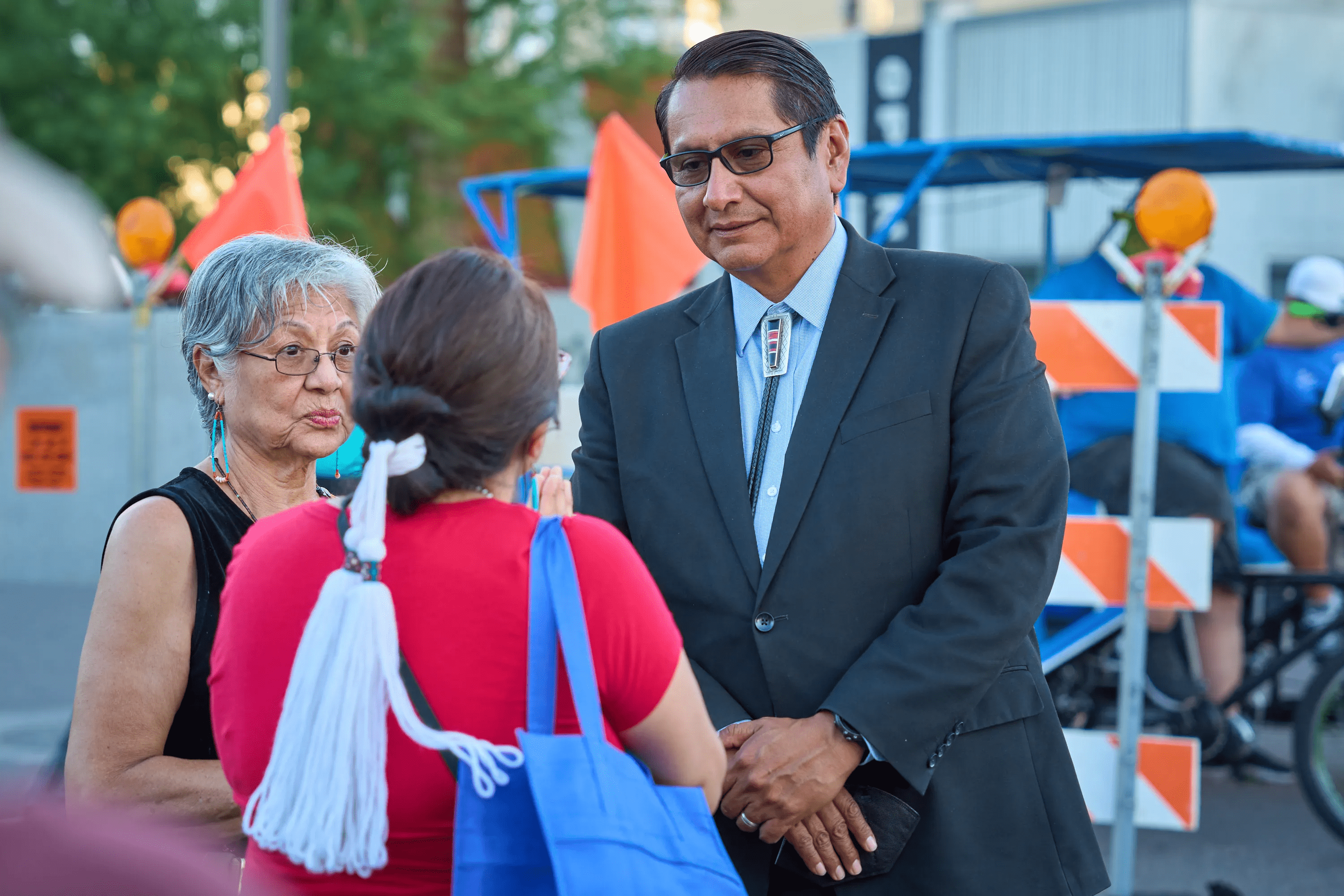An initiative on November's ballot could make it more difficult or even impossible for some Indigenous Arizonans to vote, critics of the measure say.
Proposition 309, if passed, would place another obstacle in front of Native voters, those critics say, by changing Arizona's voter identification and mail-in ballot procedures.
Under current law, a person voting in person can either show a photo ID, or, as an alternative, two forms of identification without a photo. Proposition 309 would eliminate the alternative to photo ID for in-person voting.
Native voters have long used tribal ID cards to vote, but some of those do not include photos on them. The lack of street-level rural addresses has also created problems at polling places, where voters with post office boxes have been turned away.
The measure would also add requirements for mail-in voting. Under the current law, voters must sign an affidavit with their ballot and county officials then verify the signature on the affidavit with the voter's signature on the verified voter registration documents on file.
Proposition 309 would require a voter to include their date of birth and voter identification number in the affidavit on mail-in ballots. Election officials would check the information and signatures on mail-in ballot affidavits against voter registration records.
Rachel Hood, Arizona Democratic party deputy political director, said it's not only Proposition 309 that is aimed at disenfranchising the Native votes. She listed three other measures on the ballot: Propositions 128, 129, and 132, all related to voter initiatives.
- Proposition 128 would allow the Legislature to change ballot measures that voters approve, or to divert funds from them, if either the Arizona or U.S. Supreme Court determines a measure is unconstitutional.
- Proposition 129 would require future voter initiatives to cover only one subject and would require a description of that subject in the title. Any portion of an initiative not addressed in the title would be void, even if approved by voters.
- Proposition 132 would require 60% of voters to approve any new tax using a ballot measure.
“Together these three measures are an attempt at a power grab that will make it harder for Arizona voters to exercise their right to pass their own laws," said Hood. "These measures are supported by some of the same groups who support Prop 309, which makes it all the clearer that their motives are to silence Arizona voters."
How Prop 309 affects Native voters
Although Native Americans in Arizona successfully litigated their right to vote in 1948, it wasn’t until 1970 that they could fully participate in the voting process after the Supreme Court upheld the ban against using literacy tests.
“Even when the Arizona Supreme Court stated Native Americans had the right to vote, it was another 20 years before they got rid of the language test for Native Americans," said Kris Beecher, a member of the Navajo Nation and an associate attorney with Dickinson Wright PLLC law firm. "This basically said if you don’t speak English to a certain degree you couldn’t vote.”
The literacy test was just one example of suppressing the Native vote in the past, he said. He and others believe Proposition 309 is another tactic to diminish the power of the Native vote.
“It places an undue burden on voters, especially those who already have a hard time voting,” said Hood. “For Native voters, anything that requires address-displaying forms of ID are harder to access because they typically do not live in areas with traditional street addresses."
Traveling to obtaining government identification can be a challenge, Hood said. It can take hours one way for voters to travel to certain offices that can issue a card, on top of other factors such as time and gas.
"The mailing process to receive such documentation takes longer due to an already stressed postal system,” Hood added.
Under Proposition 309, voters casting mail-in ballots could provide a driver's license or non-operating identification license number, the last four digits of a social security number, or a unique identifying number provided by the secretary of state for voter registration purposes.
The fee for government-issued IDs, also known as non-operating licenses, would be waived as long as the person states on the application that they have applied to meet the requirements for voter registration.
But on the Navajo Nation, which spans over 27,000 square miles, the offices where a person would be able to get IDs are only located in Chinle, Window Rock, Teec Nos Pos and Tuba City.
“The reality for Native Americans who don’t have the same type of access to services whether it is the government, or any other things, this just needlessly complicates our ability to vote,” said Beecher, who has worked with the Native Vote organization since 2014 and was also the Arizona Democratic Party's regional voter protection director for the Navajo Nation in 2020.
“If you know the size of the Navajo Nation, it’s a ridiculous concept to ask a person to drive two, three hours to get an ID so they can drive another two or three hours on election day to show up and try to vote," Beecher said. "You’re adding hours of time for people who may not have a vehicle to vote, and it’s a tactical decision J.D. Mesnard and everyone who came up with this.”
Arizona Sen. J.D. Mesnard, R-Chandler, was one of the sponsors of Proposition 309, which has the support of other conservative groups such as the Arizona Free Enterprise Club, Goldwater Institute, and the Republican Liberty Caucus of Arizona. The campaign for the measure is being led by Arizonans for Voter ID.
Hood said Mesnard and the other groups have a long history of trying to make it harder for people to vote.
In a Sept. 20 debate with Pinny Sheoran, president of the League of Women Voters of Arizona, Mesnard discussed his position on Proposition 309. In the debate, which was aired on Arizona PBS, Mesnard said there is a "crisis of confidence" when it comes to fair elections, and said he knows voters who have de-registered because they did not like what has happened in past elections.
Sheoran noted that the measure would impose difficulties on Indigenous voters, perhaps excluding this base of voters from voting. Mesnard said that isn't the case.
"Tribal IDs, as long as there is a photo there, that's still OK," said Mesnard, who didn't touch on the subject beyond that. He said the measure isn't excluding voters and that anyone who doesn't have a photo ID can get it free if it's for voting purposes.
Tribes in Arizona that don't have tribal I.D's are the Navajo Nation, Gila River Indian Community, Havasupai, Hopi, Tohono O'Odham and San Juan Southern Paiute, according to Sheoran.
The Arizona Republic reached out to Mesnard for comment, but he has not responded.
Hood said Proposition 309 supporters “have been behind several of the voter restriction bills that passed through the state Legislature this year, like the proof of citizenship law that is currently being held up in court.
“These groups only started talking about our elections when their candidate lost in 2020, and their claims of supporting “election integrity” are based on the Big Lie," Hood said. "Prop 309 is a solution in search of a problem that does not exist.”
The intent of proposals such as Proposition 309 has always been to limit the voting power of minority populations because of the high Native and Latino vote, she said. Proposition 309, she added, is part of the legacy of voter disenfranchisement.
Access to IDs and street addresses raises barriers
Election 2020 will always be a sore subject for conservative voters, Hood and others say, because Native voters turned up at the voting polls and turned a Republican Arizona into a Democratic state in the presidential vote for the first time in over 20 years. Since then, conservative lawmakers and current conservative candidates for the upcoming elections have held strong to the narrative of a stolen election that has been proven not to be true.
Educating Native voters and encouraging the Native vote has gained momentum as the midterms near. Tory Dolan, Native Vote Fellow in the Arizona State University Indian Legal Clinic, works on the Arizona Native Vote Election Protection Project and answers calls to the Arizona Native Vote Hotline. She also helps educate tribal communities, advocates and leaders on Arizona election law and helps train Election Day volunteers.
“My goal is to help Native American voters as they navigate Arizona's often confusing and frustrating election system,” said Dolan. “I take this work very seriously because as an Indigenous person, a citizen of the Choctaw Nation of Oklahoma, I know that Indigenous people have a unique and underrepresented perspective on U.S. politics. The vote of Indigenous voters in Arizona has historically been suppressed and stifled, and Tribal communities have yet to realize their full power in voting.”
Proposition 309 would be problematic for many Indigenous voters in Arizona, Dolan said. Elders who were born at home and issued a delayed birth certificate may not know their government-issued birthday or may face confusion because different government agencies regularly assign different birthdates.
“For example, in the Indian Legal Clinic, we worked with a Navajo elder who was born at home and had to obtain a delayed birth certificate from the state. That state-issued birthdate did not match the birthdate that Indian Health Services assigned to her and created confusion and difficulty for her when accessing basic services,” she said.
“Many people assume that everyone knows their birthday, but that assumption comes from an inherent bias, and the proposition as written does not account for Indigenous elders in that circumstance,” she said.
The requirement to list a government issued identification number is also an issue, Dolan said.
“This presents a problem for Indigenous voters that do not have access to state issued ID and, unless they hold on to their voter registration card that was mailed to them, would be unable to access their voter issued identification number,” Dolan explained.
It also undermines the effort of the tribes and the Inter-Tribal Council of Arizona, which fought to have Tribal IDs qualify, Dolan said.
"Proposition 309 changes the requirements for in-person voter ID and would prevent many forms of tribal identification from being used or would require forms of tribal identification to be supplemented with additional information,” Dolan said.
Other forms of identification accessible to Native people, such as Certificate of Indian Blood that voters can use now, she said, could not be used if Proposition 309 goes into effect because they do not have a photo or an address.
“As the Association of Arizona Recorders pointed out, a similar law in Texas resulted in the disenfranchisement of a significant number of voters,” said Dolan. “Native voters in Arizona, because of socioeconomic barriers, geographic isolation, lack of equitable access to mail, the rate of non-English speakers, among other factors, indicate to me that Proposition 309 would likely burden Indigenous voters.”






